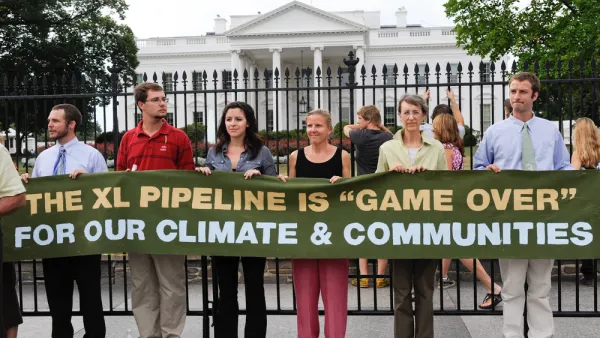In an editorial for The New York Times, Verlyn Klinkenborg bemoans the Harper administration's silencing of scientists in favor of political ideology, resource extraction, and public ignorance.
In the United States, the Keystone XL pipeline has been the subject of heated debate between environmentalists, scientists, energy interests, and politicians across the ideological spectrum. Has a similar discussion taken place in Canada, where the pipeline originates? It would appear not, if Klinkenborg's characterization of Prime Minister Stephen Harper's control over the level of scientific debate taking place in the country is accurate.
"Over the last few years, the government of Canada — led by Stephen Harper — has made it harder and harder for publicly financed scientists to communicate with the public and with other scientists," he writes. "Now the government is doing all it can to monitor and restrict the flow of scientific information, especially concerning research into climate change, fisheries and anything to do with the Alberta tar sands — source of the diluted bitumen that would flow through the controversial Keystone XL pipeline."
"There was trouble of this kind here in the George W. Bush years, when scientists were asked to toe the party line on climate policy and endangered species," adds Klinkenborg. "But nothing came close to what is being done in Canada."
FULL STORY: Silencing Scientists

National Parks Layoffs Will Cause Communities to Lose Billions
Thousands of essential park workers were laid off this week, just before the busy spring break season.

Retro-silient?: America’s First “Eco-burb,” The Woodlands Turns 50
A master-planned community north of Houston offers lessons on green infrastructure and resilient design, but falls short of its founder’s lofty affordability and walkability goals.

Delivering for America Plan Will Downgrade Mail Service in at Least 49.5 Percent of Zip Codes
Republican and Democrat lawmakers criticize the plan for its disproportionate negative impact on rural communities.

Test News Post 1
This is a summary

Test News Headline 46
Test for the image on the front page.

Balancing Bombs and Butterflies: How the National Guard Protects a Rare Species
The National Guard at Fort Indiantown Gap uses GIS technology and land management strategies to balance military training with conservation efforts, ensuring the survival of the rare eastern regal fritillary butterfly.
Urban Design for Planners 1: Software Tools
This six-course series explores essential urban design concepts using open source software and equips planners with the tools they need to participate fully in the urban design process.
Planning for Universal Design
Learn the tools for implementing Universal Design in planning regulations.
EMC Planning Group, Inc.
Planetizen
Planetizen
Mpact (formerly Rail~Volution)
Great Falls Development Authority, Inc.
HUDs Office of Policy Development and Research
NYU Wagner Graduate School of Public Service



























